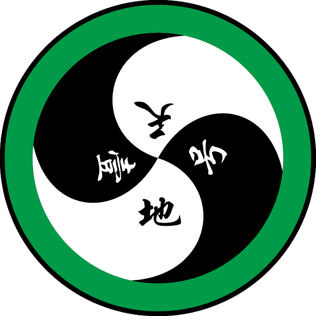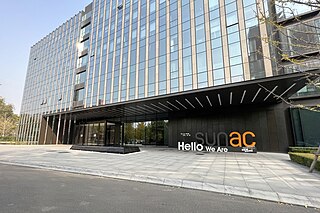
Chenghai is a district of the city of Shantou, Guangdong Province, China.
China United Airlines (CUA) is a low-cost airline and a subsidiary of China Eastern Airlines. It is headquartered at Beijing Daxing International Airport in Beijing.

Shanxi cuisine, or Jin cuisine, is derived from the native cooking styles of Shanxi Province in China. It is famous for noodles, fried flatbread and sour tastes. The cuisine is also famed for using its locally produced vinegar, just like in Huaiyang cuisine, but the flavour is totally different.

Black vinegar is dark-colored vinegar traditionally used in Chinese and other East Asian cuisine.

Urban rail transit in China encompasses a broad range of urban and suburban electric passenger rail mass transit systems including subway, light rail, tram and maglev. Some classifications also include non-rail bus rapid transport. As of 31 December 2023, China has the world's longest urban rail transit system with more than 10,000 km (6,200 mi) of urban rail nationwide in 49 systems in 47 cities, accounting for 9 of the 10 longest metro systems, with the exceptions of the Moscow Metro or metro systems in Seoul combined if metro systems in the same cities are merged in the rank.
The Hangzhou Wahaha Group Co., Ltd. is a private group of companies, and the largest beverage producer in China. The company is headquartered in Hangzhou, Zhejiang province. "Wa ha ha" signifies "laughing child".

Lychee wine is a full-bodied Chinese dessert wine made of 100% lychee fruit. This wine has a golden colour and rich, sweet taste. It is usually served ice cold, either straight up or on the rocks with food. Lychee wine is believed to pair better with shellfish and Asian cuisine than with heavier meat dishes. This refreshing beverage can also be used as a cocktail mixer paired with other spirits.

Yuexiu District is one of 11 urban districts of the prefecture-level city of Guangzhou, the capital of Guangdong Province, China, located west of the Tianhe District and east of the Liwan District. It is the commercial, political and cultural centre of Guangdong and noted for its high-quality education. The Guangdong provincial government and the Guangzhou city government are both located in the Yuexiu District. Established in 1960, the district absorbed the former Dongshan District in May 2005 along with several former subdistricts of the Baiyun and Tianhe district. Yuexiu District has 18 streets under its jurisdiction. The total area is 33.8 square kilometers. According to the seventh census data, as of 0:00 on 1 November 2020, the resident population of Yuexiu District was 1,038,643.

Zhanjiang Tiandi No.1 FC was an association football club located in Zhanjiang, Guangdong, China.

China Huiyuan Juice Group Limited, established in 1992 and headquartered in Beijing, is the largest privately owned juice producer in China. It is engaged in the manufacture and sales of juice and other beverage products. Its products include fruit juice and vegetable juice, nectars, bottled water, tea, and dairy drinks.

Chen Jianlong is a professional Chinese footballer who currently plays as a defender for Meizhou Kejia in the China League One.

Dalian Hi-tech Zone or DHZ is an industrial district in the western suburbs of Dalian, Liaoning, China. It extends about 30 kilometres along Lüshun South Road and Guoshui Highway in Shahekou District and Lüshunkou District, where many of the world's multinational technology companies have operations.

Sunac China Holdings Limited, or Sunac, is a major property developer headquartered in Tianjin, China. The company focuses on large-scale, medium to high-end property developments. It does not only focus on its home market of Tianjin, but also has operations in Beijing, Chongqing, Wuxi and other cities.
Chen Gang is a former Chinese politician. Best known for his term in Beijing beginning in 2006, Chen played a prominent role in constructing the venues of the Beijing Olympics and subsequent urban development projects. Elevated to the municipal standing committee in 2012, Chen seemed destined for higher office. However, he was abruptly moved to the North-South Water Transfer project in 2017. He was disgraced in 2019 and is currently under investigation for graft.
Chen Xuedong, also known as Cheney Chen, is a Chinese actor and singer. He is best known for his role as Zhou Chongguang in the film series Tiny Times (2013–2015).
The Coastal corridor is a high-speed rail corridor running along the eastern coast of China, stretching from Dalian in the north to Fangchenggang in the south and passing through the cities of Shenyang, Qinhuangdao, Tianjin, Dongying, Weifang, Qingdao, Lianyungang, Yancheng, Nantong, Shanghai, Ningbo. Fuzhou, Xiamen, Shenzhen, and Zhanjiang. The Weifang–Qingdao stretch splits into two, one directly connecting Weifang to Qingdao, the other connecting Weifang to Qingdao through Yantai. As apart of China's "Eight Vertical and Eight Horizontal" network, announced in 2016, this corridor is an extension of the Hangzhou–Fuzhou–Shenzhen passenger railway from "Four Vertical and Four Horizontal" network. The line will comprise a mixture of high-speed railway lines, upgraded conventional rail lines and intercity railways.

Chen Xingxu also known as Oliver Chen is a Chinese actor and model. He is known for his roles as Yang Kang in The Legend of the Condor Heroes (2017), Gu Xiaowu / Li Chengyin in Goodbye My Princess (2019), Tan Xuan Lin in Fall In Love (2021) and Shaodian Youqin inThe Starry Love (2023).

Chen Yiwen is a Chinese diver.
Chen Junwu was a Chinese engineer and an academician of the Chinese Academy of Sciences (CAS).












